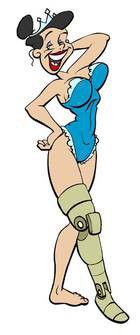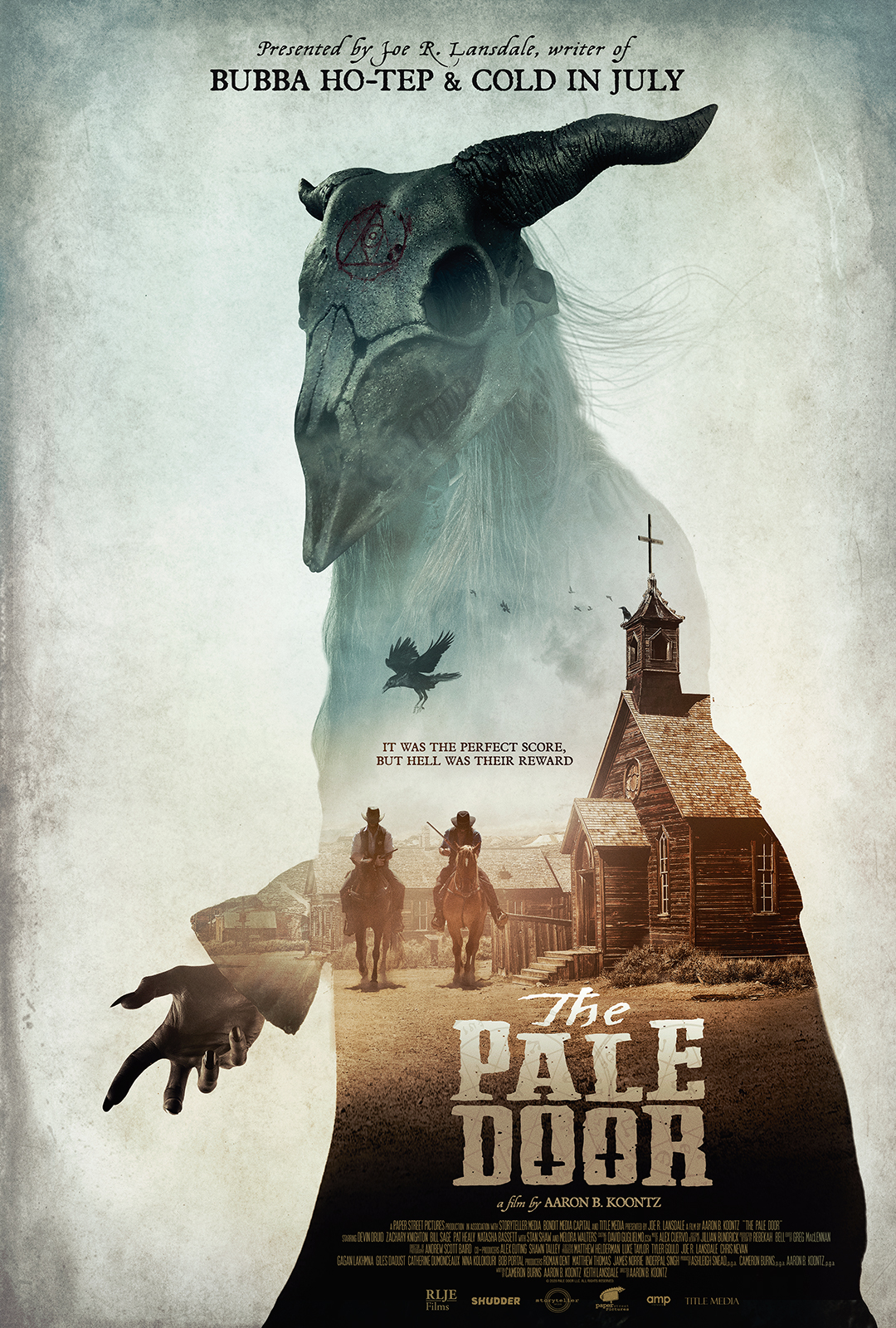
I love genre mash ups. Albert and Costello plus Universal Monsters? Please and thank you. Aliens and cowboys? Take my money. Costume drama horror? 100% yes. Zombie musical? Sign me up. In Aaron B. Koontz’s latest genre hybrid, THE PALE DOOR, the director explores a world in which a gang of old west outlaws meet a coven of Salem witches, and I am all in!
The story follows the Dalton gang, a collection of ragtag bandits planning a lucrative train heist. While the actual robbery goes off without a hitch, the trunk full of loot the crew recovers turns out to contain a mysterious young women instead of the riches they expected. From here, the gang’s big night takes a most unexpected turn as they are lured to a brothel in a nearby ghost town... what could possibly go wrong?
THE PALE DOOR is a fun and freaky little tale of fascinating what ifs. While the main gist of the film is the nerve racking cat-and-mouse chase between the bandits and their supernatural predators, a moving subplot about the Dalton brothers and their family’s past lends the film some emotional punch as well.
I was very lucky recently to get to speak with one of the stars of the film, Pat Healy. Healy portrays one of the leaders of the gang and the mastermind behind the holdup. I’ve actually had the opportunity to hang out with the talented actor a few times at Fantastic Fest when he was there supporting CHEAP THRILLS and another year as a jury member, so I was really excited to get to talk to him about his latest effort in THE PALE DOOR.
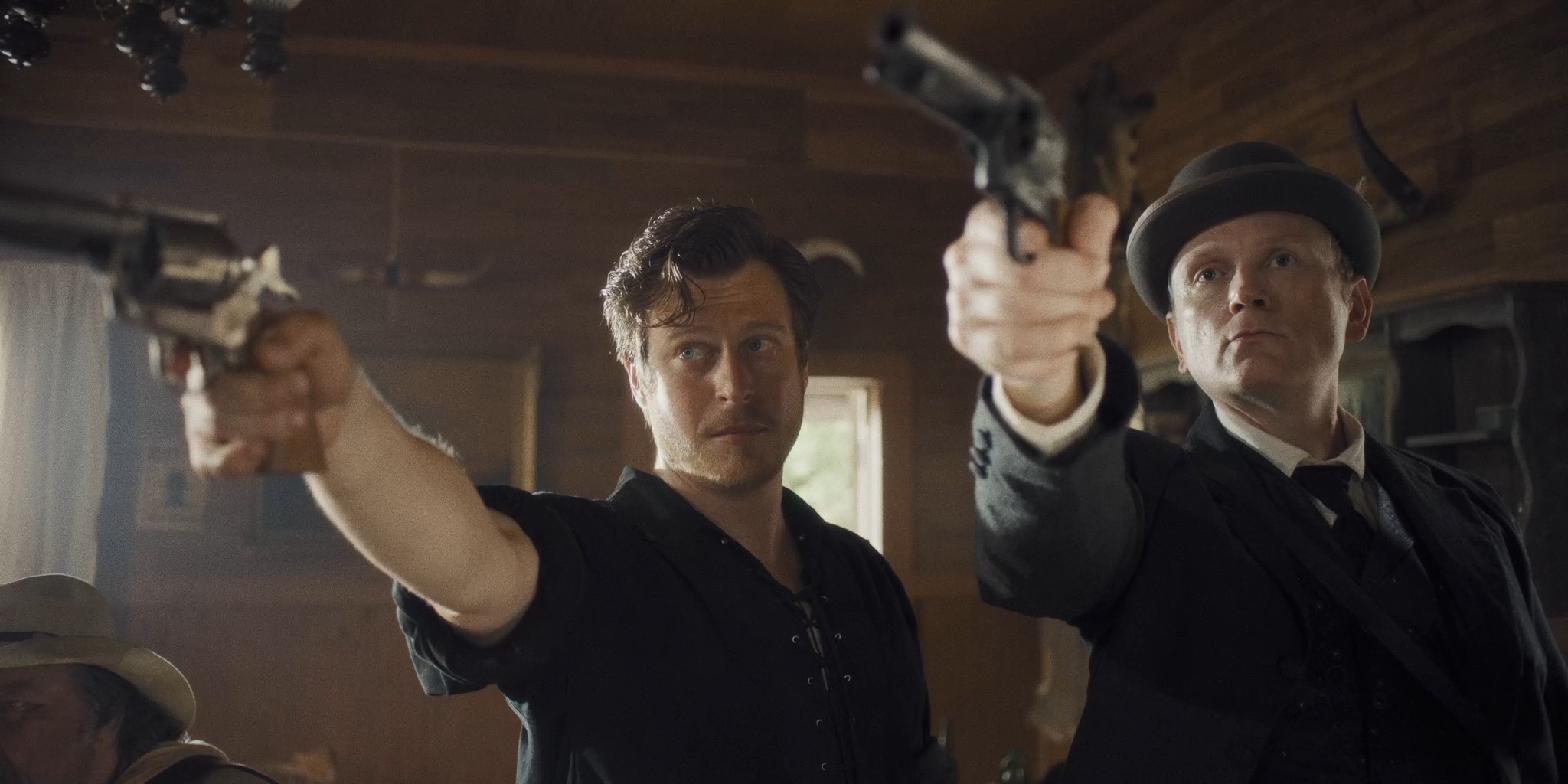
Annette Kellerman:
Hey, Pat, how are you doing?
Pat Healy:
Good, how are you? Where are you, Austin?
Kellerman:
Yeah, I'm in Austin, so just burning up right now.
Healy:
Yeah, it is here too. Did you live out here at one point?
Kellerman:
It did not. I have lots of friends out there though, but we met at Fantastic Fest several years ago.
Healy:
Yes.
Kellerman:
Yeah, so I'm excited to talk to you.
Healy:
I remember that. Likewise.
Kellerman:
So I better get into it since we only have 10 minutes.
Healy:
Yes.
Kellerman:
I know in your career you've bounced around a lot in mainstream TV and film, but you also, of course, pop up in genre fair and smaller, more esoteric films as well. Can you talk just a little bit about the difference, for you, in working on bigger productions versus working on these smaller genre films?
Healy:
Sure. Yeah. I mean, on bigger things, just in general you have more time and money to do stuff, and sometimes that works to your advantage because you just have more time to prepare. I would like to say, as a general rule, I do better work the more prepared I am, but the fact is that some of my best work is in these independent movies where I have next to no time to prepare. So there's probably something about the pressure cooker element of a compressed time schedule and budget that feeds this energy that I have. Because, preparation for me, is largely done beforehand anyway, I don't like to trouble people too much with what I'm thinking or what I'm doing on set, I like to just be able to do it and they can tell me to adjust it here or there, if it's not right, we'll fix it. And you have a lot less time to do that in a lower budget, independent things, but there's also this, I suppose, the urgency to it that really causes you to put the pedal to the metal and turn out something that is... You feel better when you have more time and more money, but you probably sometimes, maybe all the time, do better work if you don't have that-
Kellerman:
If you're not under the gun.
Healy:
There's something about starving artists that do better work than somebody who's sitting comfortably.
Kellerman:
Right. You're forced to get creative in many of those instances.
Healy:
Yes, and especially in something like this where you're playing someone who's under duress, it really does feed it if you're in fact under duress.
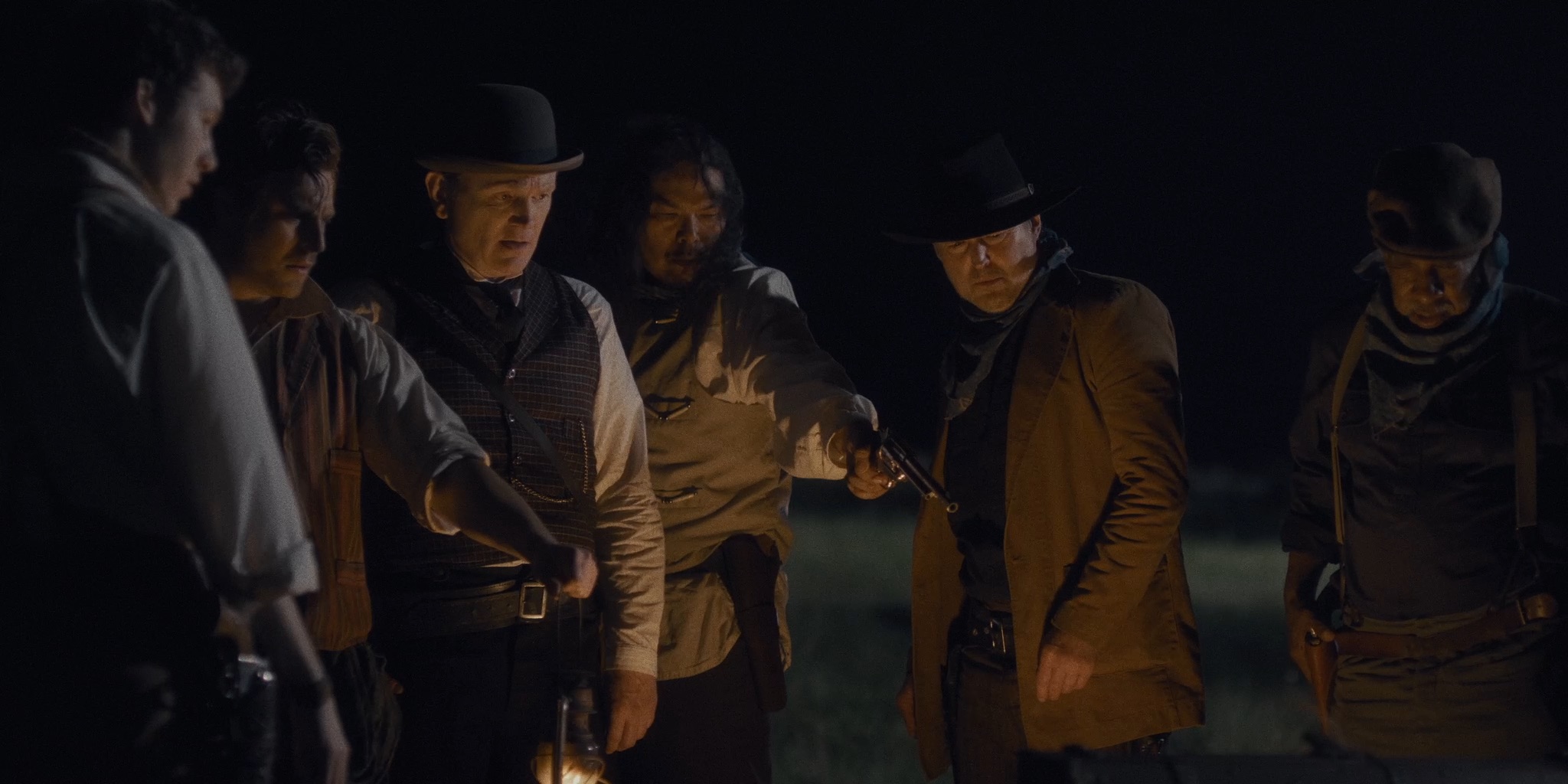
Kellerman:
So, it's like a motley crew in this film of the typical Western characters, and yours is more the bowler hat, three piece suit type in that genre. Aside from what's written on the page, how do you establish yourself in such a terrific and large ensemble cast?
Healy:
Well, I mean, the idea, as you say, in the script was that he is the brains of the operation, probably more educated and he approaches everything logically. So we see him coming up with this plan for this train robbery, which he doesn't actually go participate in, but just draws up these plans and facts and figures about this is how it's going to work from a logical standpoint. And as you said, he's more nattily dressed, and his accent is a little bit more educated and refined. And so what makes it interesting, I guess for me, is that what happens to that person when thrown into something to which logic and reality do not apply? When you're starting at that baseline... And we shot the movie in sequence luckily, so you're starting at that baseline of what we're talking about, which is all put together and logical, and then this something that's supernatural that he probably doesn't believe in and can't explain, and therefore it's a shock. So that's where I'm coming from. If I'm looking at the overall arc of it before I get into it, he's got to get from there to there. And it's a huge help to shoot it in sequence, because you can do it in real time, and things like what Jillian Bundrick did with the costumes were amazing. The second you put those on, the hat to the boots, you know who you are and it makes you stand a certain way and it makes you behave a certain way, and that does a lot of the work for you. So yeah, it's coming from that intellectual place of, "Okay, this is who the character is, and this is where he goes." And then all the other things help you along the way, and then it really is manic shooting in this compressed timeframe with that amount of money. Once we get into the craziness that, really, you just don't have to pretend a lot, it really is just crazy just react to things as they're going.
Kellerman:
I bet! And you're no stranger to body horror, which in some of your work has been played more for shock value, and of course, in some instances it's played more for just honest horror. Can you talk a little bit about, just as an actor, negotiating the mechanics of some of these gags while you're still trying to hit whatever note it is the director is trying to achieve? I mean, it's got to be tricky sometimes with some of those effects.
Healy:
It is. Yeah. I mean, it's always a balance. I mean, for me, I've always understood, as you say, body horror. I've been a fan of David Cronenberg, who's arguably the creator of-
Kellerman:
The king, yeah.
Healy:
And probably inarguably. So in his movies, the physical manifestation of these things is always an allegory for something spiritual that's breaking down. And so, we were just speaking about someone who comes from a place of logic and everything's fine, to experiencing this, and it's kind of a natural progression. And then once you have whatever it is, the appliances, the blood poured all over you and in your mouth, in this case, fake glass that has to be eaten or the other things that are done with it, at that point you're really letting go... Because I couldn't even see once I had all this stuff on, and I'm really just going by them, I'm going inside feeling what I'm feeling and listening to them to tell me that it looks all right and it's coming out right. It's nice to see the movie and see that it worked because I'm very interested in physical acting just overall, and some of that just does have to do with the technical aspect of standing in the right place and the right light, and all that stuff that you can do with your body, given whatever resources you have... because for me, especially contemporary acting on television seems to be just acting with the head, and I'm not so interested in that. I like getting... When I directed my own movie, I did a lot of things in wide takes because I want to see what the whole body does, and I want to see how people interact with each other within the frame in that way and using the whole body. I'm super interested in that. So it's a specific challenge to be able to do that, because you're excited to be able to do that, but yet, as you say, you have these constraints on you. But you can use those constraints as they could be benefits too.
Kellerman:
Right, as another tool.
Healy:
You're in pain, you're in it, you're so-
Kellerman:
It just looks so tricky.
Healy:
It goes right along with it.
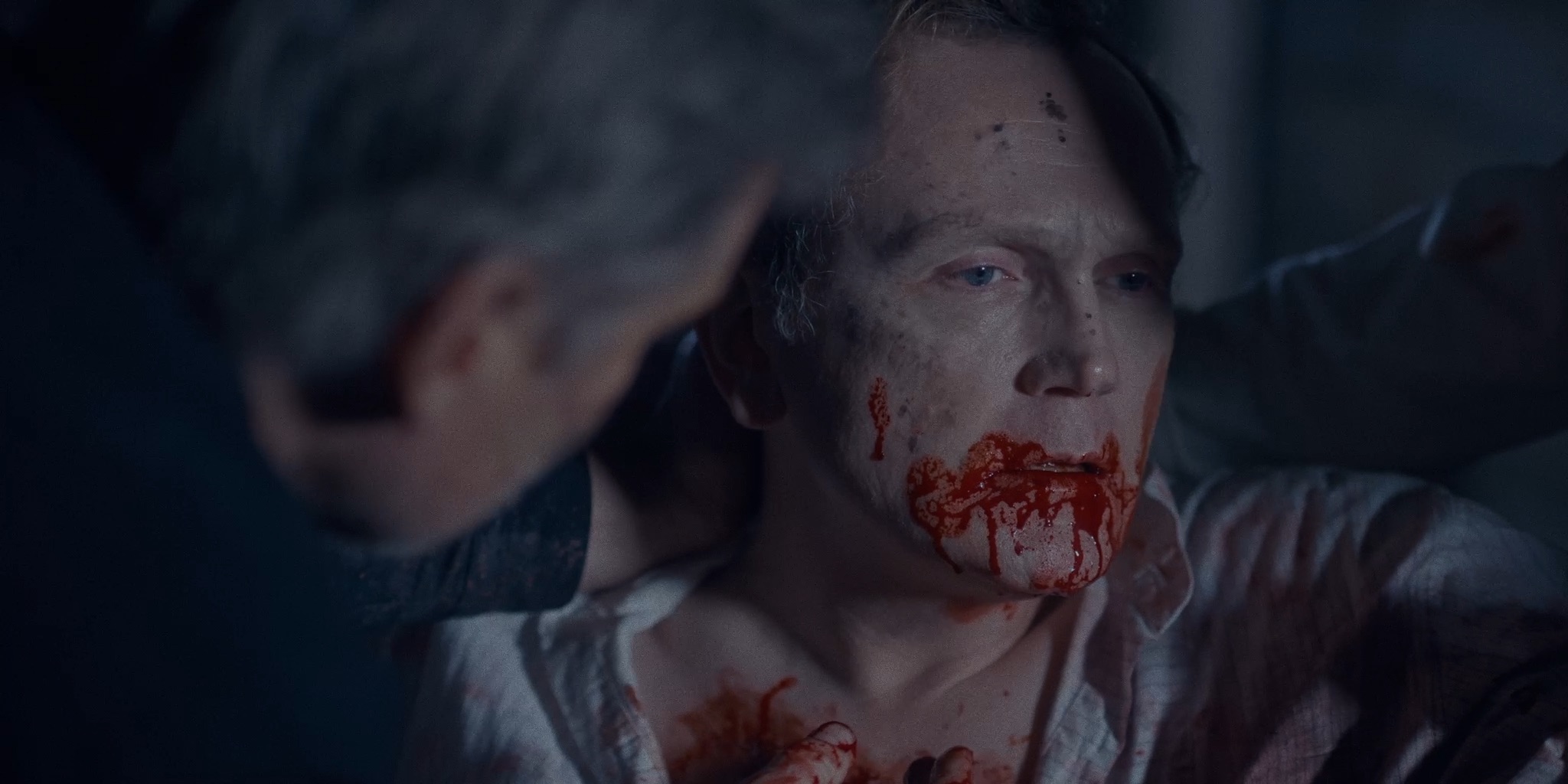
Kellerman:
Okay. Final question. I just want to know. I mean, you're a prolific character actor at this point. It seems like you’ve worked nonstop in recent years, so what has it been like recently with this stupid virus halting everything? What does it look like moving forward for a working actor like yourself, how does it work right now?
Healy:
I wish I had an answer to that. I mean, I'm scared like anybody else, I'm sure. I was very fortunate that I had two long running... I was on two different television series simultaneously up until March 9th. So I was sitting on a nest egg-
Kellerman:
Right, thank God.
Healy:
So I didn't have to worry about that so much. But going forward, it looks like I may do a smaller movie again next month, in October. I mean, I'm just taking things as they come like anyone else, I don't know. I mean, people keep saying, "Oh, this is supposed to shoot then and then." It doesn't seem possible, but I don't really know what the future holds, and I get worked up or anxious some days and some days, and I'm just like, it's not in my control or anything I can do about it. I am considering things like moving, and all of the practical things, like moving out of here [L.A.], there's no reason for me to be here for the duration, all that stuff that I think a lot of people are doing. But it's been, I think, a good time to reflect on all of these things and where I'm at in my life and what I want to do. I would like to just continue doing things the way that I've been doing, as you say, things have been ramping up for me. But if they don't, then I'll go do something else, I guess. I don't know. I'm not too worried about it. I would love to do this for the rest of my life, but nature's not up to me.
Kellerman:
Isn’t that the truth. None of it is in our hands, but we make the best of it when we can... make hay when the sun shines.
Healy:
Exactly.
Kellerman:
Well, I guess I need to cut it off here, but I'm so glad to chat with you. And hopefully we'll get to talk face to face, maybe at Fantastic Fest one day again, one of these days.
Healy:
Yeah, 2025.
Kellerman:
Yes, hopefully!
I love getting an actor’s perspective (especially one who has also taken a turn behind the camera), so I really appreciated Healy’s take on working in such a specific genre film. Check out THE PALE DOOR today in theaters, On Demand, and Digital!
Rebecca Elliott
aka Annette Kellerman
